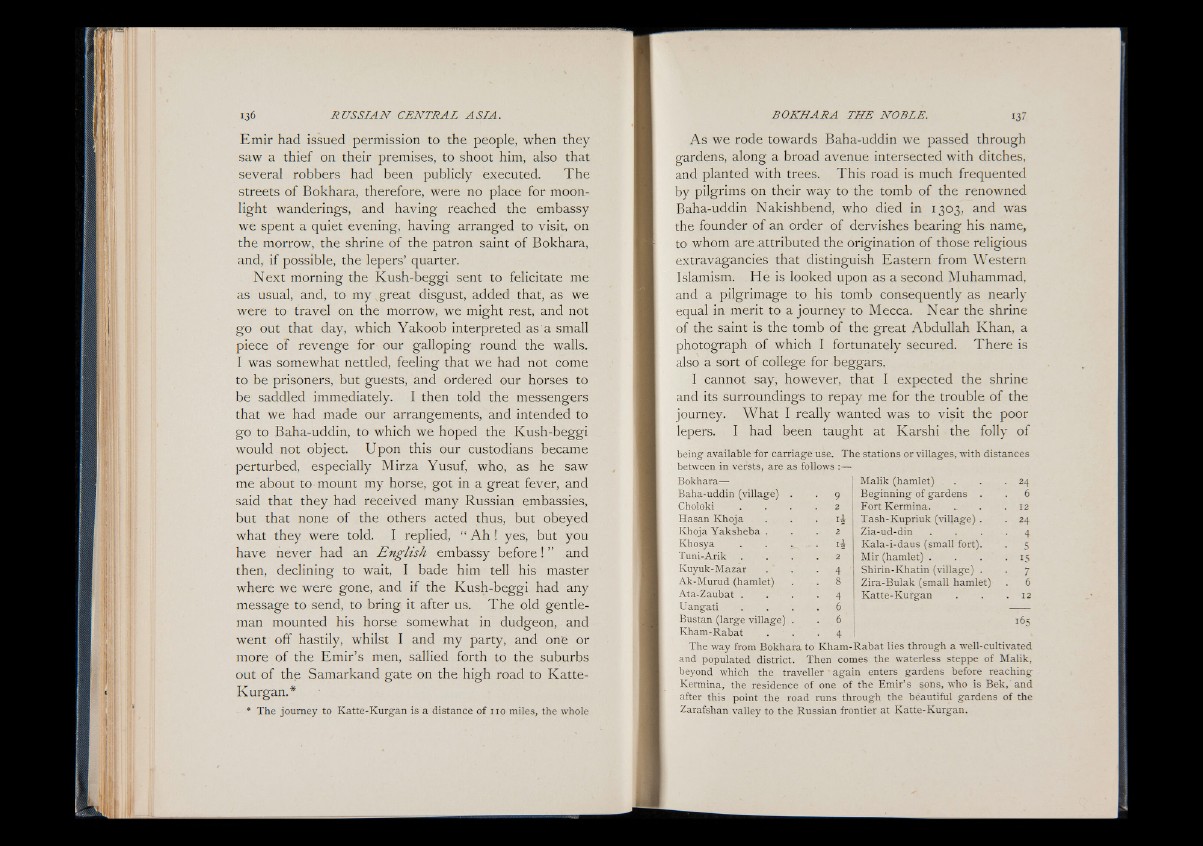
Emir had issued permission to the people, when they
saw a thief on their premises, to shoot him, also that
several robbers had been publicly executed. The
streets of Bokhara, therefore, were no place for moonlight
wanderings, and having reached the embassy
we spent a quiet evening, having arranged to visit, on
the morrow, the shrine of the patron saint of Bokhara,
and, if possible, the lepers’ quarter.
Next morning the Kush-beggi sent to felicitate me
as usual, and, to my g great disgust, added that, as we
were to travel on the morrow, we might rest, and not
go out that day, which Yakoob interpreted as a small
piece of revenge for our galloping round the walls.
I was somewhat nettled, feeling that we had not come
to be prisoners, but guests, and ordered our horses to
be saddled immediately. I then told the messengers
that we had made our arrangements, and intended to
go to Baha-uddin, to which we hoped the Kush-beggi
would not object. Upon this our custodians became
perturbed, especially Mirza Yusuf, who, as he saw
me about to mount my horse, got in a great fever, and
said that they had received many Russian embassies,
but that none of the others acted thus, but obeyed
what they were told. I replied, “ Ah ! yes, but you
have never had an English embassy before! ” and
then, declining to wait, I bade him tell his master
where we were gone, and if the Kush-beggi had any
message to send, to bring it after us. The old gentleman
mounted his horse somewhat in dudgeon, and
went off hastily, whilst I and my party, and onfe or
more of the Emir’s men, sallied forth to the suburbs
out o f the Samarkand gate on the high road to Katte-
Kurgan.*
* The journey to Katte-Kurgan is a distance of n o miles, the whole
As we rode towards Baha-uddin we passed through
gardens, along a broad avenue intersected with ditches,
and planted with trees. This road is much frequented
by pilgrims on their way to the tomb of the renowned
Baha-uddin Nakishbend, who died in 1303, and was
the founder of an order of dervishes bearing his name,
to whom are attributed the origination of those religious
extravagancies that distinguish Eastern from Western
Islamism. He is looked upon as a second Muhammad,
and a pilgrimage to his tomb consequently as nearly
equal in merit to a journey to Mecca. Near the shrine
of the saint is the tomb of the great Abdullah Khan, a
photograph of which I fortunately secured. There is
also a sort of college for beggars.
I cannot say, however, that I expected the shrine
and its surroundings to repay me for the trouble o f the
journey. What I really wanted was to visit the poor
lepers. I had been taught at Karshi the folly of
being available for carriage use. The stations or villages, with distances
between in versts, are as follows : —
Bokhara— Malik (hamlet) , . - 24
Baha-uddin (village) . • 9 Beginning of gardens . 6
Choloki 2 Fort Kermina. . 12
Hasan Khoja Tash-Kupriuk (village) . . 24
Khoja Yaksheba . 2 Zia-ud-din • 4
Khosya . . Kala-i-daus (small fort). 5
Tuni-Arik 2 Mir (hamlet) . . . • “S
Kuyuk-Mazar • 4 : Shirin-Khatin (village) . 7
Ak-Murud (hamlet) . 8 Zira-Bulak (small hamlet) . 6
Ata-Zaubat . • 4 Katte-Kurgan . 12
Uangati . 6 ----
Bustan (large village) . -• ■■ IjL *65
Kham-Rabat . . ■ 4
The way from Bokhara to Kham-Rabat lies through a well-cultivated
and populated district. Then comes the waterless steppe of Malik,
beyond which the traveller ' again enters gardens before reaching
Kermina, the residence of one of the Emir’ s sons, who is Bek, and
after this point the road runs through the béautiful gardens of the
Zarafshan valley to the Russian frontier at Katte-Kurgan.